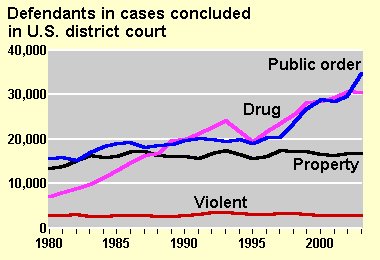Perceptions of Crime Still Mirror TV
Many communication scholars spend a lot of time examining how television viewing distorts our perceptions of the "real" world. Crime is the most obvious distortion. When people are asked about crime, they give answers that are more in line with televised reality than actual reality.
I tried to dig up some crime statistics, but I gave up in frustration as the government's Web sites are about as helpful as a hammer to the temple. Here is one chart that gives you an idea of the rank of violent crime. The violent crimes are down at the bottom. They are least prevalent in federal court. But they are the most prevalent on television.

My Indiana University colleague James Angelini collected some data for me where participants listed thoughts associated with crime. It seems that I did not give good enough instructions for the participants because they did not do what I wanted them to do. Instead, they did some sort of free association task where they listed general words and concepts related to crime.
Fair enough. So my crack lab manager Jaimie Hardesty coded these data. I will find a purpose for them yet, but for now consider the chart above and then consider that:
I tried to dig up some crime statistics, but I gave up in frustration as the government's Web sites are about as helpful as a hammer to the temple. Here is one chart that gives you an idea of the rank of violent crime. The violent crimes are down at the bottom. They are least prevalent in federal court. But they are the most prevalent on television.

My Indiana University colleague James Angelini collected some data for me where participants listed thoughts associated with crime. It seems that I did not give good enough instructions for the participants because they did not do what I wanted them to do. Instead, they did some sort of free association task where they listed general words and concepts related to crime.
Fair enough. So my crack lab manager Jaimie Hardesty coded these data. I will find a purpose for them yet, but for now consider the chart above and then consider that:
- Murder was listed by 61.6% of participants.
- Robbery/Breaking and Entering, 51.2%.
- Rape/Sexual Assault, 51.2%.
- Shootings/Guns, 51.2%.
- Theft/Shoplifting, 43%.
- ...
- White Collar Crime, 10.5%.
That's right. Far down the list were the more common -- but boring and usually omitted from TV -- white collar crimes. And even this was likely inflated by TV coverage, as 7% of the participants specifically mentioned Enron.
Once again, when people are asked about crime, they tell you about the TV's version ... not the real one. We continue to debate what it means ... and who it affects and how. But it remains interesting to me that time and again, when people are just asked to talk about the world, they talk about the mediated world.




 FOLLOW SAM ON TWITTER
FOLLOW SAM ON TWITTER
 SUBSCRIBE TO THIS FEED
SUBSCRIBE TO THIS FEED

0 Comments:
Post a Comment
<< Home